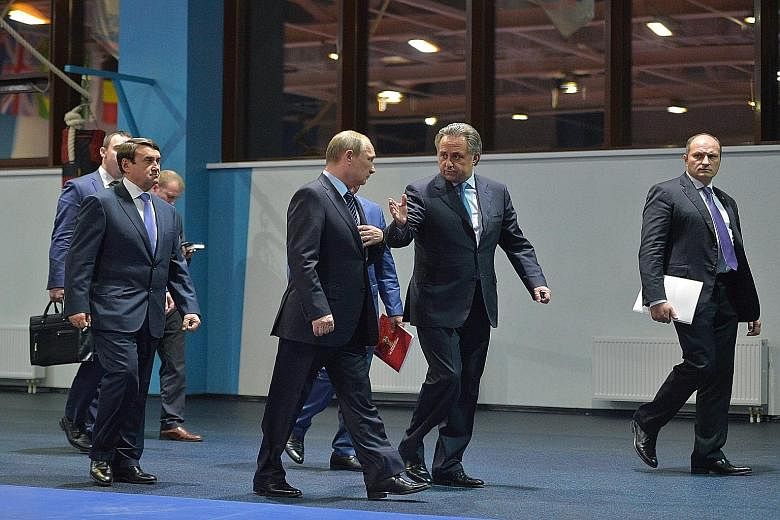MOSCOW • Russia, accused of state-sponsored doping, has said it is ready to establish a new anti-doping agency hours before world athletics chiefs meet with exclusion from the 2016 Olympics in Rio de Janeiro a potential long-term consequence for Moscow.
Sebastian Coe, the recently-elected president of the International Association of Athletics Federations (IAAF), was last night (this morning, Singapore time) set to preside over a conference call of the body's 26 members from London.
Russia's Minister for Sport Vitaly Mutko told R-Sport news agency hours before the IAAF meeting that Moscow is ready to reform or "create a new anti-doping organisation" if it is demanded for by the IAAF or the World Anti-Doping Agency (Wada).
A simple majority is all that will be needed to confirm a suspension for Russia.
It is accused of widespread doping by an independent commission set up by Wada in a report which has shaken track and field, one of the Olympics' main draws.
The 335-page report also blasted Russian officials for blackmailing their own athletes to cover up positive tests as well as destroying test samples.
Although Russian officials are expected, in an act of reconciliation, to admit to some cases of cheating, the IAAF is under huge pressure to take strong action less than a year out from the Rio Olympics.
But a leading IAAF council member, legendary pole-vaulter Sergei Bubka, warned that it would be wrong to punish innocent athletes for the transgressions of others.
"All those involved, officials, managers or coaches, must pay the price," the Ukrainian told the AIPS world sports journalists association. Bubka lost to Coe in the race for the IAAF's top job in August.
"But ordinary athletes, those who have nothing to do with this matter, should not have to miss a single competition."
On Thursday, Russia sent a formal reply to the allegations.
Acting president of Russia's athletics federation Vadim Zelichenok said it had produced the response "in such a way as to try to prove our innocence".
"How many pages is it?
"One or 100, it's not important," he added.
In another development, Russia's Olympic Committee president Alexander Zhukov flew to Lausanne in Switzerland on Thursday evening for talks with International Olympic Committee chief Thomas Bach, R-Sport reported.
The fallout from the Wada report's damning conclusions reached as far up as Russian President Vladimir Putin.
He has ordered officials to launch their own internal investigation and cooperate with the international anti-doping authorities.
Should an Olympic athletics ban be eventually imposed, sports minister Mutko rejected the notion of a Russia boycott of next year's Olympic Games.
In quotes published by British newspaper The Guardian, he said that even if Russia's athletes are suspended, "we don't plan to boycott anything, anywhere".
AGENCE FRANCE-PRESSE

